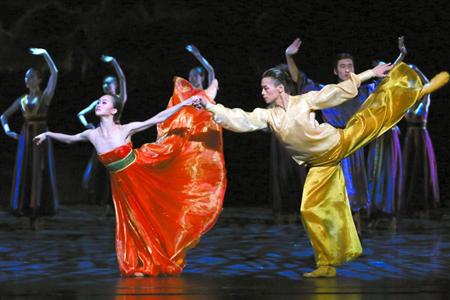
真得演得很好, 没抱希望去看, 只是想借此机会学习中国古典, 并介绍给孩子, 我自己本来至少一半是冲着音乐去的, 一进剧院坐下, 舞剧一开始就被深深吸引:舞台布置简洁古朴,有的时候配上灯光又华丽无比, 音乐让人都不觉得这是在中国, 倒是很西亚, 不过也没什么, 古代大唐不是很受西域影响吗?其实那是一个我们听说过但陌生的国度, 我们现代中国人除了懂几首古代唐诗, 还懂其他吗?
这部舞剧几乎是西方人理解和表达的 《长恨歌》, 除了舞蹈演员是中国人, 舞编舞台布置灯光服装都是老外, 或者几乎多是法国人, 音乐也是, 特别是Armand Amar的, 很中东诗情画意, 他音乐中的西域悲情, 是那片土地和天空的, 中东历史悠久, 中东不等于伊斯兰。
Jaya Ibrahim, 印尼人, 世界知名的室内设计大师,负责舞台布置, 很遗憾他2015年5月份突然去世, 未能看到最终的演出, 但他的才华却不可磨灭.....
还有日本鼓, Kodō (鼓童?) is a professional taiko drumming troupe. Based on Sado Island, Japan, they have had a role in popularizing taiko drumming, both in Japan and abroad. They regularly tour Japan, Europe, and the United States. In Japanese the word "Kodo" conveys two meanings: "heartbeat" the primal source of all rhythm and, read in a different way, the word can mean "children of the drum".
好像有听到 波兰作曲家 Henryk Górecki的 "Sorrowful songs", 人类悲哀的感受都一样吗?
还有Philip Glass 的音乐,总有一种泉水溪流般的清新和氧气,去除繁琐有反复循环的清新, 能量和热情, 我跟女儿说Philip Glass 曾经研究过印度教,印度音乐,她说难怪音乐有印度的味道, 我怎么没听出来印度味道呢?
舞蹈演员跳得很出色又很镇静, 一反中国戏剧舞剧上习惯的热闹, 舞台布置也不是那么中国化, 没有什么时间地点讲故事套话, 干净幽远的舞台布置, 让人更注意欣赏舞蹈演员的用芭蕾语言去刻画 一代国君唐明皇和国色国香杨贵妃的爱情故事, 和灵魂追随。杨贵妃最后被唐太宗放弃而大度视死如归,演的很好
可以说, 这是一台国际化的 《长恨歌》, 不仅仅是属于中国的了, 已经是全人类的了, 或许当中国人一提起唐太宗会批评他为什么沉溺女色而丧失江山,对他们的故事已经不感兴趣,而西方人倒有兴趣研究他们为什么这对灵魂老要在一起, 活着和先后离世后,
舞剧的最后是唐太宗的忠实随从在那转一个东西:灯光一打, 雪花从天而降, 唐明皇和杨贵妃又在天上会和了
看完演出后, 女儿说没想到演得这么好, 她给10 out of 10, 确实是挺好的,难道是音乐是西方人导演的原因吗??
************************************************
Echoes of Eternity is co-produced by the Shanghai Grand Theatre and Shanghai Ballet.
Creative team:
Choreographer: Patrick de Bana
Set designer: Jaya Ibrahim
Costume designer: Agnes Letestu
Light designer: James Angot
Scriptwriter: Jean Francois Vazelle
Literature Consultant: Sifu TANG
Assistants to Choreographer: Jean Marie Didiere, Attila Istvan Bako
Music: Armand Amar, Ravia Goldschmidt, Kodo, Henryk Górecki, Philip Glass
Dancers:
Emperor: WU Husheng
Lady Yang: QI Bingxue
Moon Fairy: ZHAO Hanbing
Gao Lishi: ZHANG Yao
Chen Xuanli WU Bin
An Lushan ZHANG Wenjun
ECHOES OF ETERNITY is based on one of China’s greatest love stories: that of the Emperor Tang Xuanzong and his favourite concubine, Yang Yuhuan. In the early half of his reign (712-756) Emperor Tang Xuanzong – the seventh (and longest reigning) emperor of the Tang Dynasty – was a diligent ruler and was credited, along with an astute team of advisors, with pushing Tang China towards new heights of economic and international powers. Although he had many concubines, consorts and even wives during his reign, he fell hopelessly in love with 18-year old Yang Yuhuan, the wife of one of his sons. Yang Yuhuan was known as one of the Four Beauties of Ancient China and when the Emperor ordered her to leave his son, she retired to a nunnery…but not for long. The Emperor soon made her his favourite consort and they lived happily together in his later years. The love story quickly captured the imagination of the public and of writers of Chinese and Japanese literature but then tragedy struck: during a rebellion, as the Emperor and his entourage were fleeing imminent attack, his guards turned on him and blamed the rebellion on Lady Yang’s family…the young woman was so distraught and knew there was only one thing she could do…
(https://www.londontheatre1.com/news/137494/shanghai-ballet-echoes-of-eternity-london-coliseum/)